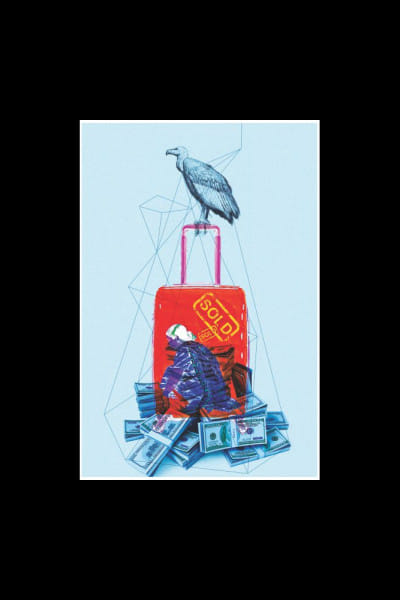The endless wait for justice

26-year-old Jalal Ahmed represents a rare trend. He is one of very few victims in the country who has managed to send his traffickers—the ones who kidnapped him and forcefully sent him to a jungle in Thailand back in 2013—to jail.
With the help of a few NGOs, Jalal had filed a case under the Prevention and Suppression of Human Trafficking Act. While that did send the dalals, who had tricked him, to jail, the victory was short-lived. The traffickers managed to get bail through the High Court soon after they were sentenced to prison. And ever since, they have been threatening both Jalal and his family to withdraw the case.
There have been at least 4,152 cases filed under the trafficking act. However, the number of convictions is just around 10 to 15 per year. According to the Bangladesh Counter Trafficking-in-Persons, of the 778 trafficking cases filed in 2017, only one witnessed a successful conviction.
What the above essentially depicts is that while Jalal wasn't able to put his traffickers behind bars for good, he was lucky to get a conviction, an outcome that thousands of other victims are yearning for.
The eldest among his siblings, Jalal wanted to help his family, which was struggling to make ends meet. It was in these trying times that he met Ziaur Rahman, a dalal who resided in the same village in Cox's Bazar. He told Jalal that he could send him to Malaysia for work.
“He asked me to go with him to Chittagong to get my passport made,” recalls Jalal. “Instead, he tricked me and took me to Katabonia in Teknaf and held me captive inside a house,” he adds.
After a week in Teknaf, Jalal was taken to the shore one night and squeezed onto a small boat. “It was meant to carry just four to five people, but there were 15 of us. We all sat on top of each other. There was barely any room to keep your feet. It was dreadful,” he recalls.
After a painful, five-hour-long journey, the victims were transferred to a trawler. They were kept there for 23 days.
“We got just one meal a day. If we asked for more, they would torture us,” he says. The trawler gradually became more crowded and there was a total of 241 people in it before it started moving.
12 days later, they reached a jungle in Thailand. “We were treated like animals there. We were tortured until we agreed to ask our families to pay for our release,” says Jalal. “My family took loans and paid Tk 3 lakh as ransom to a dalal in Bangladesh.”
The completion of the transaction, however, did not end Jalal's travails. It was precisely during that period that the Thai police learnt of the kidnappings in the jungle and made mass arrests during a raid. As a result, Jalal and the other victims had to languish in jail for 11 months.
“The situation in the jail was unbearable. At one point a number of us went on a hunger strike. We told the jail authorities that you can either kill us or release us, there is no point living like this,” remembers Jalal. That's when the Thai police officials contacted the Bangladeshi Embassy, which paved the way for Jalal's return and eventually led to the filing of the case against the traffickers in Bangladesh.
According to researchers, a majority of the cases don't work out because victims are forced to settle matters outside the court in exchange of money.
Take for instance, the case of Wahida Begum. She had gone to Saudi Arabia through a recruiting agency to work as a housemaid. Exactly 26 days after she landed in the Middle East, she called her husband to let him know that she had been raped by the father, his brother and the son of the family.
Wahida's husband filed a trafficking case against the recruiting agency and, with the help of various NGOs, compelled the agency and the Bureau of Manpower Employment and Training to fast-track Wahida's return. It was successful. Wahida returned home within a week.
However, as soon as she returned, Wahida's husband decided to strike a deal worth Tk 70,000 with the recruiting agency and settle the issue. This deal was made even though Wahida didn't want it.
“Do you think I am crazy enough to go against my husband? If he does not want to pursue the case, there's nothing I can do. At least we got a portion of the money that we invested, back,” says Wahida.
Aside from out-of-the-court settlements, researchers say, another reason that is delaying the cases filed under this act is the absence of tribunals for trafficking cases. The government, as per the trafficking act of 2012, was supposed to form separate tribunals to deal with trafficking cases in order to speed up the process. However, no tribunals have been set up as yet.
As a result, the women and children repression prevention tribunals were tasked with additional duty to deal with the cases. However, with a huge backlog of cases of its own, these tribunals, according to researchers, have not been effective enough to deal with trafficking cases.
Another reason why it becomes difficult to dispose off these cases is the transnational nature of the crimes. Since the victims often suffer in other countries, it becomes difficult to provide evidence in court to charge the local traffickers. For instance, when Wahida returned home, she returned empty-handed and did not have any documents from the embassy that could prove the torture against her.
There's also the issue of lack of training. According to researchers, the government is yet to provide police officials specialised training to deal with matters related to trafficking. And this includes a number of aspects, right from the ability to understand the mental situation of the victim to being technically ready to nab the criminals.
“When victims go to police officials, they should try to calm them down because they have already lost a lot of money and have been immensely tortured. Instead of telling them that they deserve it, they should know how to talk to them and then take cases,” says a trafficking researcher preferring anonymity.
Last year, Bangladesh was demoted to the Tier 2 Watch List as per the Trafficking in Persons Report 2017 by the US Department of State.
Going by the current situation, it's unlikely that the country will witness a promotion any time soon. If the government and the concerned authorities actually want to create a wind of change, they really need to start thinking of ways of implementing the existing laws appropriately.

 For all latest news, follow The Daily Star's Google News channel.
For all latest news, follow The Daily Star's Google News channel. 



Comments